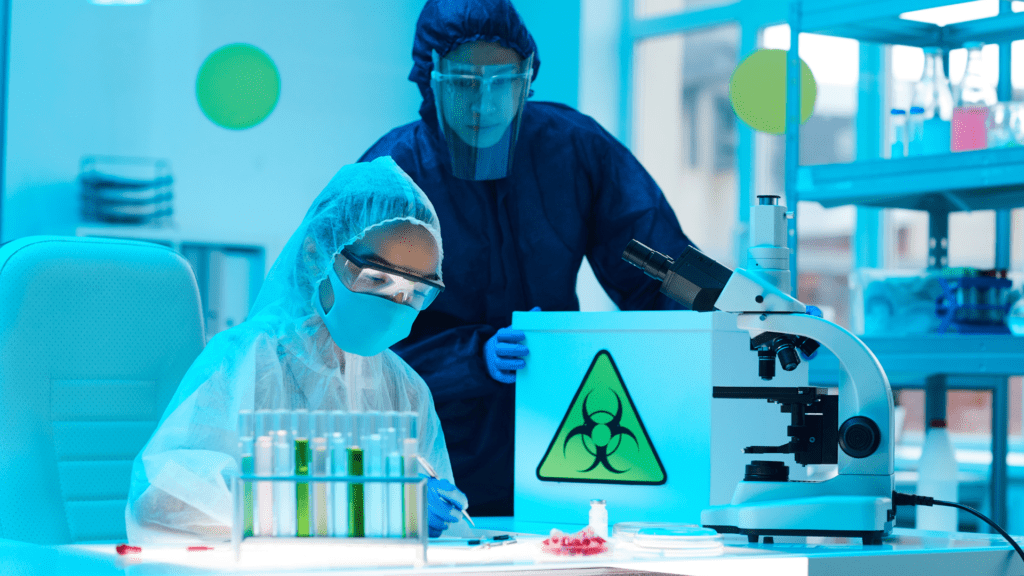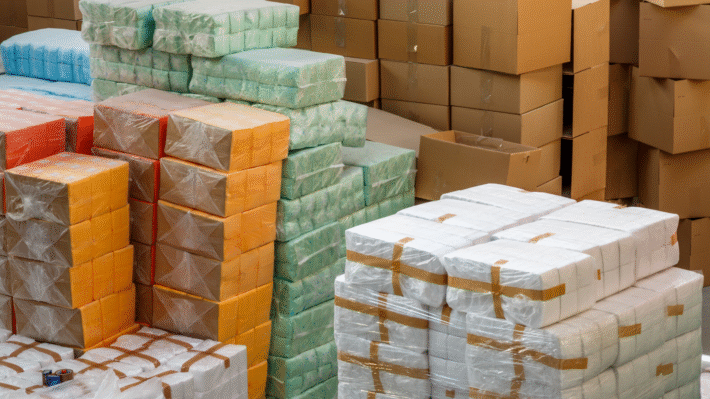Bio-Based Chemicals: From Waste to Sustainable Resources

Hold on to your hats because we’re diving into the amazing world of bio-based chemicals! Imagine a future where the everyday products we use are not made from expensive and polluting oil, but from renewable biomass like waste and agricultural residues. That’s right, the shift from petrochemicals to bio-based sources is not just a dream anymore; it’s a necessity for our planet’s sustainability.
Bio-based chemicals, born from the best of nature, have the potential to build a circular economy where nothing is wasted. From energy crops and algae to advanced green technologies, these sustainable heroes are set to revolutionize how we think about chemicals. In this exciting journey, we will preview the amazing sources and processes that turn biomass into green gold, explore the limitless applications, and peek into the bright future that sustainable chemical products promise. Join us as we embark on this incredible voyage toward a cleaner, greener world!
The Importance of Bio-Based Chemicals
What Are Bio-Based Chemicals?
Definition of Bio-Based Chemicals
Bio-based chemicals are made from renewable sources. This means they come from plants, trees, or even waste. Instead of using up the earth’s oil, these chemicals use things that can grow back. This is important because it helps us save our planet’s resources. Bio-based means these chemicals are natural and better for the earth.
Why They Matter for Sustainability
Sustainability is about taking care of our earth. Bio-based chemicals help because they are not from fossil fuels. When we use bio-based stuff, we’re using things that can grow again. This helps slow down climate change and makes our planet a happier place. Using these chemicals means less pollution and a cleaner world for our kids.
The Shift from Petrochemicals
Problems with Petrochemicals
Petrochemicals come from oil. Using them hurts our planet. They cause pollution and harm nature. When we burn oil, it puts bad stuff in the air. This makes the earth too hot and can make people sick. Plus, oil will run out one day. That’s a big problem because then there won’t be any left to make things we need.
The Role of Bio-Based Alternatives
Bio-based alternatives are the good guys. They help us use less oil. We can make the same things, like plastics and fuels, without hurting the earth. These alternatives are made from renewable stuff, which means we won’t run out. More and more people are seeing the good they do for our planet. Using bio-based means we’re smart about how we use nature’s gifts, keeping them around for a long time.
Renewable Sources of Biomass
Biomass is like nature’s treasure chest, full of valuable materials that can be turned into something useful. Let’s explore it!
Understanding Biomass
Biomass is all about using natural things to make chemicals and products. But what exactly is it? Let’s break it down.
Types of Biomass Sources
Biomass sources come from all around us. Think about the leftover stalks from a farmer’s field or the wood chips from logging. These are called agricultural residues and forestry by-products.
- Agricultural Residues: These are parts of plants left after harvesting crops, like cornstalks.
- Forestry By-products: This includes branches and sawdust from cutting trees.
- Energy Crops: These are special plants grown just for energy, like switchgrass.
- Algae: Tiny plants that grow in water and are rich in oil.
- Waste: Things we throw away, like food scraps and paper.
With so many sources, biomass is practically everywhere!
Key Components of Biomass
Biomass is packed with goodies that can be transformed into chemicals and fuels. Here’s what’s inside:
- Cellulose: A part of plants that gives structure, like tiny building blocks.
- Lignin: Helps plants stand tall and strong.
- Sugars: Natural sweet stuff that can be turned into energy.
- Oils: Found in plants and algae, useful for making biofuels.
These components are nature’s gifts, ready to be turned into renewable products.
Sustainability of Biomass
Using biomass isn’t just about making products. It’s about doing it in a way that’s good for the planet.
Advantages of Renewable Biomass
Renewable biomass is like a superhero for the Earth. Here’s why:
- Carbon Neutrality: When biomass is used, it releases the carbon it took in while growing. So, it doesn’t add extra carbon to the atmosphere.
- Reduces Waste: Instead of piling up waste, biomass turns it into something useful.
- Energy Independence: Using local biomass means less need for foreign oil.
Biomass helps keep our planet healthy and clean.
Responsible Sourcing Practices
Getting biomass the right way is very important. Here are some ways to do it responsibly:
- Sustainable Harvesting: Take just what you need, no more. This helps keep natural areas thriving.
- Using Wastes: Turn trash into treasures by using waste materials.
- Protecting Habitats: Make sure wildlife has a place to live by preserving forests and fields.
Being responsible with biomass ensures we have a greener future and a healthier planet.
Using renewable sources of biomass wisely can change our world for the better, turning natural materials into something amazing and sustainable.
Converting Biomass into Chemicals
Imagine turning plants and waste into useful chemicals. That’s what converting biomass is all about. Let’s explore how we do it.
Biochemical Conversion Methods
Biochemical methods are like magic tricks of nature. They transform biomass into chemicals using living things or natural processes.
Fermentation Processes
Fermentation is a word that means turning sugars into other useful things. Just like turning grapes into wine or milk into yogurt. For biomass, it means changing sugar into things like ethanol and acids. This is done with the help of tiny living things called microorganisms. They eat up the sugar and give us something new!
Role of Enzymes
Now, let’s talk about enzymes. Enzymes are helpers in the world of biochemical conversion. They speed up the process of breaking down the biomass. It’s like when you chew food, you break it down into small pieces. Enzymes help to break the biomass into sugars faster! This way, we can quickly and easily make useful chemicals.
Thermochemical and Chemical Synthesis
Another way to change biomass into chemicals is through heat and different reactions. This is known as thermochemical and chemical synthesis.
Processes Like Pyrolysis and Gasification
Pyrolysis is a big word! It means heating the biomass without burning it. It’s like cooking food in an oven without any air. This cooking gives us bio-oil and char. On the other hand, gasification turns biomass into syngas using heat, like making steam from water. Both methods give us new materials that can be turned into chemicals.
Catalysis and Its Importance
Catalysis is the star of the chemical show. A catalyst is a special substance that speeds up chemical reactions. Imagine a wizard making potions faster using a magic wand. That’s what catalysis does for conversions. It helps us create bio-based chemicals quickly, making the process smoother and more efficient.
By using these amazing methods, we can harness nature’s power to make chemicals without harming our planet. That’s the magic of converting biomass.
Products Made from Bio-Based Chemicals
Bio-based chemicals are changing the way we make things. They come from renewable resources, not oil. This change helps our planet by using green solutions. Let’s explore the exciting world of bio-based products!
Bio-Based Building Blocks
Bio-based chemicals start as “building blocks.” Think of them as the Lego pieces of chemistry. These pieces can make many other things. They are very important, and here’s why.
Common Platform Chemicals
Common Platform Chemicals: These are special chemicals that can turn into other products. They come from plants and natural materials. A couple of examples include:
- Ethanol: Commonly found in fuel and drinks.
- Glycerol: Used in soaps and creams.
- Organic Acids: Like citric acid, you find it in sodas and candies.
These chemicals are in lots of different products we use every day.
Major Industrial Applications
Major Industrial Applications: Bio-based chemicals help in big industries. They are important because they can replace fossil fu**els. Here are a few industries where they make a difference:
- Food Industry: They create additives that are safe and natural.
- Textile Industry: Eco-friendly dyes and treatments come from them.
- Construction: They offer green options like biodegradable glues.
These industries use bio-based building blocks for greener solutions.
Variety of Bio-Based Products
Bio-based chemicals are like magic ingredients. They help us make things we use all the time, but in a green way. Let’s discover how they’re turned into amazing products!
Polymers and Plastics
Polymers and Plastics: Polymers made from bio-based chemicals are terrific! They help make plastics that are better for the Earth.
- Bioplastics: Ever heard of PLA or PHA? These plastics come from plants. They’re used in things like packaging and straws.
- Bio-based PET: This plastic is in bottles and clothing. It comes from plants but works just like regular plastic.
These products aim to reduce pollution and help the environment.
Specialty Chemicals and Fuels
Specialty Chemicals and Fuels: These are unique products that serve specific purposes.
- Bio-solvents: Good for cleaning, they don’t harm air or water.
- Bio-lubricants: They keep wheels turning in an eco-friendly way.
- Biodiesel and Bioethanol: These fuels come from plants and reduce oil use.
These bio-based products show that we can have effective solutions without hurting our planet.
Bio-based chemicals are like superheroes for the Earth. They help industry and everyday life become greener. They make products we love, but from natural and friendly resources. By choosing bio-based, we support a future that is better for everyone!
Benefits and Challenges of Bio-Based Chemicals
Environmental and Economic Benefits
Positive Environmental Impact
Bio-based chemicals come from renewable sources like plants and algae. This means they can help cut down on pollution. Unlike regular chemicals made from oil, bio-based ones can lower the amount of harmful gases in the air. Less pollution helps our environment and makes the Earth a cleaner place to live. We say goodbye to the big carbon footprint that traditional methods leave behind because bio-based chemicals are the friendlier choice. They have a smaller impact because they use natural resources which can grow back again and again.
Economic Opportunities
Bio-based chemicals are not just good for the planet—they’re good for people too. They can help create jobs, especially in rural areas where these natural materials grow. New industries can pop up, bringing in money and giving people more job choices. When we depend less on foreign oil, we use more of our homemade resources. It’s like planting seeds for new business, jobs, and opportunities right at home. Imagine a world where local farmers and new techs work side by side to build a brighter future!
Overcoming Challenges and Scaling Up
Current Challenges
Shifting to bio-based chemicals isn’t a walk in the park. Different plant materials can sometimes be unpredictable. One batch might be different from the next, which can cause hiccups. Another struggle includes the initial costs—it can be pricey to get started. Also, not every place follows the same rules, leading to confusion. Sometimes, people even pretend their products are greener than they are, which is called greenwashing. These roadblocks can make it harder to go green on a larger scale.
Potential Solutions
But wait, there are ways to overcome these challenges! Advanced biorefineries can make sure quality is consistent. Streamlining processes can cut down costs and increase efficiency. Supporting policies can guide businesses and give them a boost to do the right thing. Collaboration between governments and industries is also key. If everyone works together and plays their part, bio-based chemicals can become a major player in the market. With determination and teamwork, we can climb over any hurdle. Let’s cheer on the effort for a greener future!
Future of Bio-Based Chemicals
Bio-based chemicals are paving the way to a sustainable future. But what makes them the future of the chemical world? Let’s dive in!
Innovations and Trends in the Industry
Exciting things are happening in the world of bio-based chemicals. Let’s explore these innovations and trends.
Advancements in Biorefineries
Biorefineries are like magic workshops where biomass is turned into valuable products. These facilities use plants and waste to make useful things like fuels and plastics.
- Biorefineries use every bit of the material. This means less waste!
- New technologies are making biorefineries more efficient. They can make more products from the same amount of biomass.
- Some biorefineries are now so advanced that they can use materials like algae. This is a big deal because algae grow fast and don’t need lots of land.
Advancements in biorefineries mean that they can help reduce our reliance on fossil fuels. They can produce chemicals that are essential for our daily lives.
Role of Synthetic Biology and AI
Synthetic biology and AI are two smart tools making waves in bio-based chemicals.
- Synthetic biology helps scientists design microorganisms. These tiny helpers can create specific chemicals that industries need.
Imagine tiny creatures that can make your shampoo or car fuel! - AI, or Artificial Intelligence, helps refine these processes. It figures out the fastest and most efficient way to produce chemicals.
AI acts like a super brain, finding the best methods to use resources wisely.
These cutting-edge technologies are turning dreams into reality by helping us switch from petrochemicals to bio-based alternatives.
Market and Policy Drivers
Market forces and government policies play a huge role in how bio-based chemicals evolve.
Government Policies and Incentives
Governments across the globe are encouraging the switch to bio-based chemicals.
- Policies are being made to support the use of bio-based products.
- Incentives like tax benefits are available for companies using renewable resources.
Governments want to see more green products on the shelves.
Such actions pave the way for a greener chemical sector.
Certifications and Consumer Demand
People care more about where products come from. This is where certifications and consumer demand step in.
- Certifications help consumers identify truly green products. Names like USDA BioPreferred are a stamp of approval.
- More consumers are choosing products with a smaller carbon footprint.
By buying certified products, shoppers can support a sustainable future.
Demand for bio-based chemicals continues to grow as consumers and companies strive for greener choices. This demand also pressures more industries to switch to sustainable practices.
In conclusion, the future of bio-based chemicals is bright with innovations in technology and supportive market conditions. The shift towards these eco-friendly products is real, and it’s happening now!



